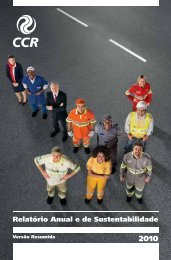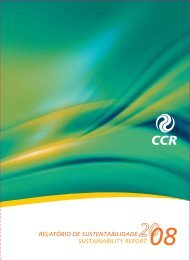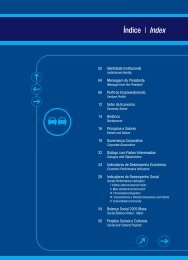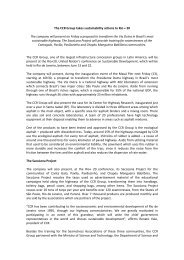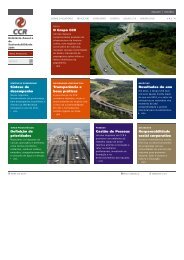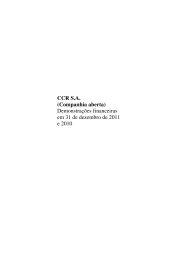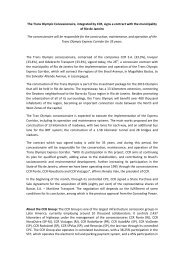pdf- Tamanho - Grupo CCR
pdf- Tamanho - Grupo CCR
pdf- Tamanho - Grupo CCR
Create successful ePaper yourself
Turn your PDF publications into a flip-book with our unique Google optimized e-Paper software.
The challenges of<br />
sustainable mobility<br />
Reduce the emissions by the<br />
means of transportation, so<br />
that they are no longer a public<br />
health problem<br />
Reduce greenhouse gas<br />
emissions produced by means<br />
of transportation to sustainable<br />
levels<br />
Alleviate traffic congestion<br />
Significantly reduce the<br />
number of deaths and<br />
accidents related to the means<br />
of transportation<br />
Reduce the noise levels related<br />
to the means of transportation<br />
Lessen the disparity in<br />
transportation conditions,<br />
between rich and poor nations<br />
Improve transportation for<br />
the people of developing and<br />
developed nations<br />
The contribution of the <strong>CCR</strong> Group<br />
Well-kept and signed highways provide better traffic flow and,<br />
consequently, less polluting gas emissions.<br />
In 2007, <strong>CCR</strong> invested around R$ 512 million in the upkeep of the<br />
highways it administrates.<br />
Well-kept and signed highways, together with guidance for<br />
bordering communities, help to reduce accident rates. Moreover,<br />
well-prepared and equipped emergency service teams contribute<br />
to lowering the death rates.<br />
During the first year of the concession, the highways administrated<br />
by the <strong>CCR</strong> Group showed a 50% reduction in the number of<br />
deaths and at least 10% in the number of accidents.<br />
In service with RodoNorte since 2005, ecological asphalt ensures<br />
a reduction of 65% to 85% of traffic noise levels<br />
Paving based on French BBTM (Béton Bitumuneux Trés Mince)<br />
specifications reduces traffic noise levels on the Castello Branco<br />
highway, administrated by ViaOeste.<br />
<strong>CCR</strong> seeks to provide services and quality on the highways it<br />
administrates that are equivalent to those of the world’s best.<br />
For that reason, it invests in upkeep, expansion, and signs on the<br />
highways, uses new technologies (like electronic toll collection), and<br />
the best highway building techniques, thus raising the quality and<br />
traffic flow on the roads. Furthermore, in order to ensure safety<br />
and quick service, the highways of the <strong>CCR</strong> Group are monitored<br />
by cameras along their entire length.<br />
The average driver approval rate of the work done by the<br />
concessionaires of the <strong>CCR</strong> Group was 82%, in 2007, according<br />
to the Datafolha Institute.<br />
A study done by the National Transportation Confederation<br />
(Confederação Nacional dos Transportes-CNT) showed that uses<br />
of highways administrated by private enterprise are much more<br />
satisfied with the roads than the users of highways managed<br />
by public agencies. Four of every five (80%) drivers classified<br />
concession highways as “excellent” or “good”, as against merely<br />
17% of government-managed highways. According to the same<br />
study, the top 23 highways of the rankings are under concession,<br />
20 of which are administrated by private enterprise.<br />
VISÃO DE SUSTENTABILIDADE | VISION FOR SUSTAINABILITY<br />
39



